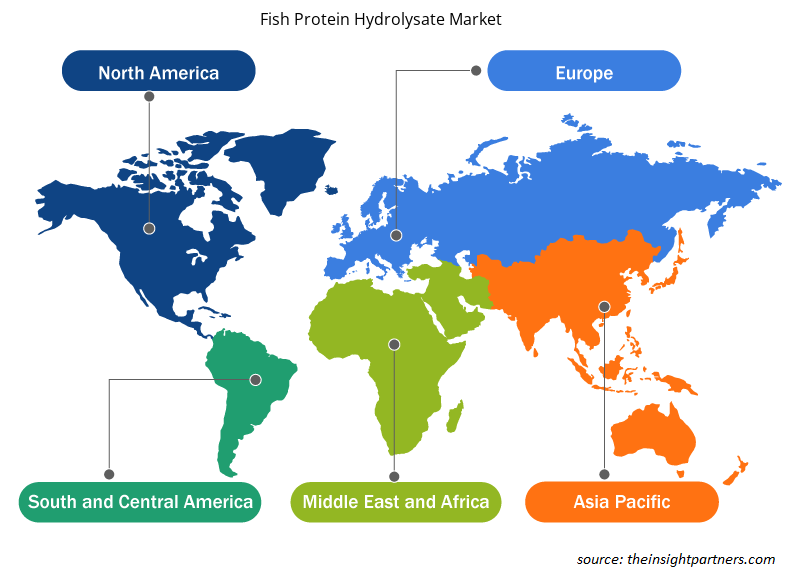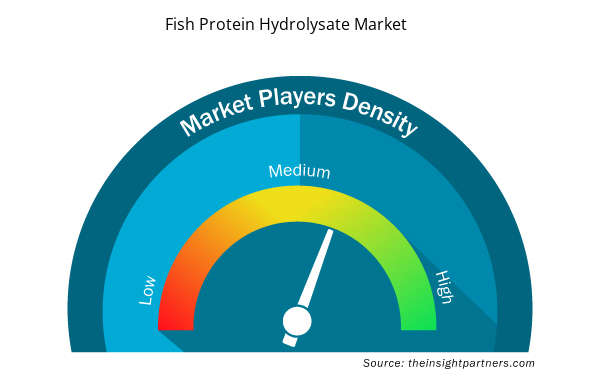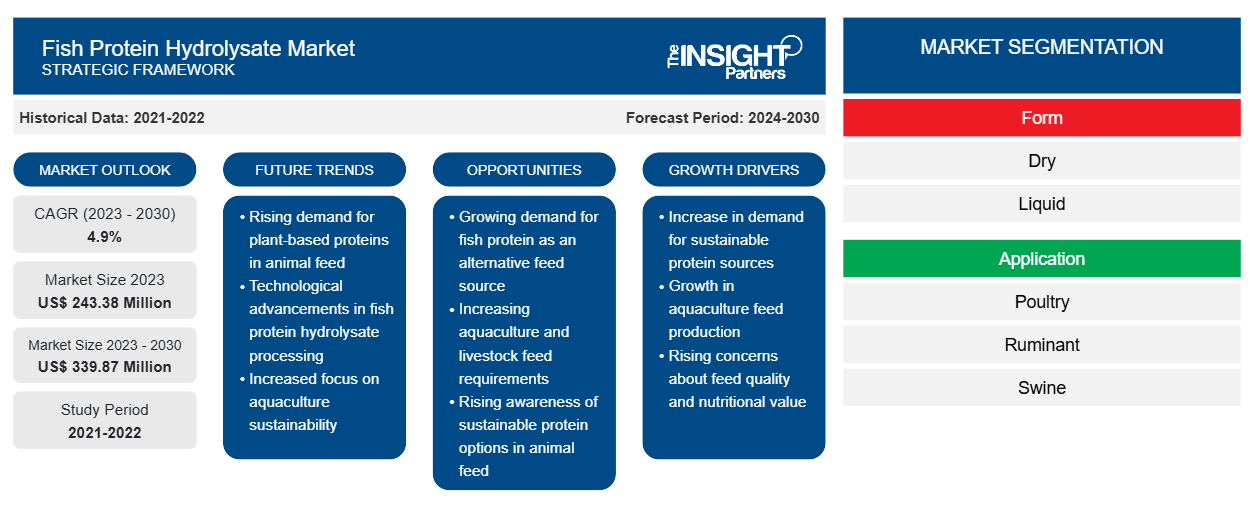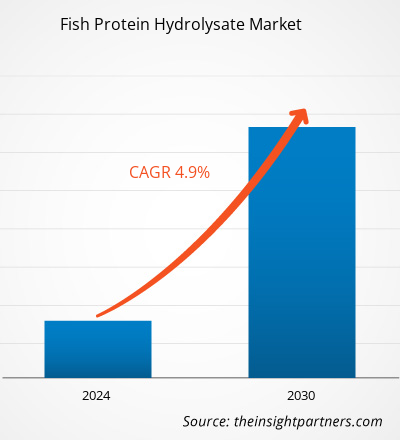[Rapporto di ricerca] Si prevede che il mercato dell'idrolizzato di proteine di pesce per l'alimentazione animale crescerà da 243,38 milioni di dollari nel 2023 a 339,87 milioni di dollari entro il 2030; si stima che registrerà un CAGR del 4,9% dal 2023 al 2030.
L'idrolizzato di proteine di pesce è un prodotto ricavato da pesce o materiale di pesce mediante il metodo dell'idrolisi proteica. Pertanto, l'idrolizzato di proteine di pesce è una miscela di proteine rotte. Si dice che gli idrolizzati di proteine di pesce abbiano una serie di proprietà migliorate rispetto alla proteina di origine, vale a dire proprietà funzionali migliorate e proprietà bioattive come attività antiossidanti o antipertensive. Di recente, l'idrolizzato di proteine di pesce ha iniziato a essere utilizzato anche come crioprotettivo per prodotti ittici congelati. Questi sono i fattori che dovrebbero guidare la crescita del mercato dell'idrolizzato di proteine di pesce per l'applicazione nei mangimi animali durante il periodo di previsione.
Nel 2022, l'Asia Pacifica deteneva la quota maggiore del mercato globale dell'idrolizzato di proteine di pesce per l'applicazione nei mangimi animali. Secondo il rapporto 2021 della Food and Agriculture Organization, l'Asia Pacifica è un mercato significativo per la produzione di acquacoltura . I paesi asiatici erano i principali produttori, rappresentando il 70% della produzione totale di animali acquatici da pesca e acquacoltura. L'idrolizzato di proteine di pesce è un ingrediente di spicco che rappresenta un requisito importante per i produttori di mangimi. La disponibilità di peptidi a basso peso molecolare e amminoacidi liberi nell'idrolizzato di proteine di pesce migliora la palatabilità dei mangimi, stimolando l'assunzione di mangimi per pesci. Pertanto, la domanda di idrolizzato di proteine di pesce è in aumento tra i produttori di mangimi per animali.
Personalizza questo report in base alle tue esigenze
Riceverai la personalizzazione gratuita di qualsiasi report, comprese parti di questo report, o analisi a livello nazionale, pacchetto dati Excel, oltre a usufruire di grandi offerte e sconti per start-up e università
- Scopri le principali tendenze di mercato in questo rapporto.Questo campione GRATUITO includerà analisi di dati che spaziano dalle tendenze di mercato alle stime e alle previsioni.
Impatto della pandemia di COVID-19 sul mercato degli idrolizzati proteici di pesce per l'applicazione nei mangimi animali
L'industria dei mangimi ha dovuto affrontare sfide cruciali come la carenza di materie prime e manodopera, un'impennata dei prezzi delle materie prime e interruzioni nelle reti di distribuzione dovute a lockdown, divieti di viaggio, limitazioni commerciali, chiusure di unità produttive e altre restrizioni imposte dal governo in tutto il mondo. Ciò ha ostacolato le attività di produzione di varie aziende nel settore dei mangimi per animali , con conseguente aumento dei prezzi degli ingredienti dei mangimi. Nell'Unione Europea, circa due terzi degli stati membri hanno sottolineato l'impennata dei prezzi dei mangimi nel settore zootecnico durante la pandemia. Inoltre, durante il picco della pandemia, la Cina ha chiuso i mercati di commercio e macellazione di bestiame e pollame nella maggior parte delle regioni. Tali barriere nel settore zootecnico hanno ostacolato la domanda di ingredienti per mangimi, il che ha avuto un impatto negativo sulla domanda di idrolizzato proteico di pesce per mangimi durante la pandemia.
Nel 2021, varie economie hanno ripreso le operazioni poiché i loro governi hanno annunciato allentamenti nelle restrizioni precedentemente imposte, il che ha dato impulso al mercato globale. Inoltre, ai produttori è stato consentito di operare a piena capacità, il che li ha aiutati a superare il divario tra domanda e offerta e altre ripercussioni.
Approfondimenti di mercato
Benefici nutrizionali dell'idrolizzato proteico di pesce nell'alimentazione animale
L'Organizzazione mondiale per la salute animale afferma che più di 50 malattie della fauna selvatica possono avere un impatto serio sul bestiame e sulla salute pubblica. In questo caso, l'implementazione di strategie nutrizionali appropriate che rafforzino l'immunità, sviluppino la salute degli animali, promuovano l'integrità e la funzionalità intestinale è fondamentale per migliorare la tolleranza allo stress degli animali e curare varie malattie. Pertanto, gli idrolizzati di proteine di pesce per applicazioni di mangimi animali vengono utilizzati per soddisfare le esigenze nutrizionali del bestiame. L'idrolizzato di proteine di pesce è una buona fonte di proteine e nutrienti come fosforo, calcio e altri minerali. Aiuta a prevenire la diffusione di malattie infettive e rafforza l'immunità degli animali contro funghi, batteri, virus e parassiti. Il consumo regolare di idrolizzato di proteine di pesce da parte dei polli da carne aiuta il loro sviluppo muscolare. Gli enzimi presenti nell'idrolizzato di proteine di pesce aiutano la morfologia intestinale dei polli da carne facilitando la digestione di alimenti fibrosi, inclusi cereali e farina di soia. Pertanto, i benefici nutrizionali dell'idrolizzato di proteine di pesce relativi alla salute degli animali guidano la sua domanda tra le industrie di mangimi animali.
Informazioni basate sui moduli
In base alla forma, il mercato globale dell'idrolizzato proteico di pesce per l'applicazione nei mangimi animali è segmentato in secco e liquido. Il segmento secco ha detenuto una quota maggiore del mercato globale dell'idrolizzato proteico di pesce per l'applicazione nei mangimi animali nel 2021 e si prevede che registrerà un CAGR più elevato dal 2022 al 2030. L'idrolizzato proteico di pesce in forma secca è significativamente preferito grazie alla sua eccellente stabilità fisico-chimica, alla lunga durata di conservazione e alle caratteristiche di facilità di trasporto. La biodisponibilità dell'idrolizzato proteico di pesce in forma secca è rapida e meno soggetta ad attacchi microbici. Tali vantaggi dell'idrolizzato proteico di pesce hanno aumentato il suo utilizzo nei processi di produzione di mangimi animali. Tutti questi fattori stanno guidando il mercato per il segmento.
I principali attori che operano nel mercato globale dell'idrolizzato di proteine di pesce per l'applicazione nei mangimi per animali includono Copalis Industry SAS, NAN Group JSC, Scanbio Marine Group AS, Janatha Fish Meal & Oil Products, 21 Pine Freezers Road Pty Ltd, Symrise AG, Kemin Industries Inc, Euro Feed Services, Holland BV, Bio-marine Ingredients Ireland Ltd e Vita Actives Ltd. Gli attori del mercato si stanno concentrando sulla fornitura di prodotti di alta qualità per soddisfare la domanda dei clienti. Si stanno inoltre concentrando su strategie quali investimenti in attività di ricerca e sviluppo, partnership ed espansione.
Approfondimenti regionali sul mercato degli idrolizzati proteici di pesce
Le tendenze regionali e i fattori che influenzano il mercato degli idrolizzati proteici di pesce durante il periodo di previsione sono stati ampiamente spiegati dagli analisti di Insight Partners. Questa sezione discute anche i segmenti e la geografia del mercato degli idrolizzati proteici di pesce in Nord America, Europa, Asia Pacifico, Medio Oriente e Africa e America meridionale e centrale.

- Ottieni i dati specifici regionali per il mercato degli idrolizzati proteici di pesce
Ambito del rapporto di mercato sull'idrolizzato proteico di pesce
| Attributo del report | Dettagli |
|---|---|
| Dimensioni del mercato nel 2023 | 243,38 milioni di dollari USA |
| Dimensioni del mercato entro il 2030 | 339,87 milioni di dollari USA |
| CAGR globale (2023-2030) | 4,9% |
| Dati storici | 2021-2022 |
| Periodo di previsione | 2024-2030 |
| Segmenti coperti | Per modulo
|
| Regioni e Paesi coperti | America del Nord
|
| Leader di mercato e profili aziendali chiave |
|
Densità degli attori del mercato dell'idrolizzato proteico di pesce: comprendere il suo impatto sulle dinamiche aziendali
Il mercato degli idrolizzati proteici di pesce sta crescendo rapidamente, spinto dalla crescente domanda degli utenti finali dovuta a fattori quali l'evoluzione delle preferenze dei consumatori, i progressi tecnologici e una maggiore consapevolezza dei benefici del prodotto. Con l'aumento della domanda, le aziende stanno ampliando la propria offerta, innovando per soddisfare le esigenze dei consumatori e capitalizzando sulle tendenze emergenti, il che alimenta ulteriormente la crescita del mercato.
La densità degli operatori di mercato si riferisce alla distribuzione di aziende o società che operano in un particolare mercato o settore. Indica quanti concorrenti (operatori di mercato) sono presenti in un dato spazio di mercato in relazione alle sue dimensioni o al valore di mercato totale.
Le principali aziende che operano nel mercato degli idrolizzati proteici di pesce sono:
- Copalis Industria SAS
- Gruppo NAN JSC
- Gruppo Marine Scanbio AS
- Prodotti Janatha Fish Meal & Oil
- 21 Pine Freezers Road Pty Ltd
Disclaimer : le aziende elencate sopra non sono classificate secondo un ordine particolare.

- Ottieni una panoramica dei principali attori del mercato degli idrolizzati proteici di pesce
Segnala i riflettori
- Tendenze industriali progressive nel mercato dell'idrolizzato proteico di pesce per l'applicazione nei mangimi animali per aiutare gli operatori a sviluppare strategie efficaci a lungo termine
- Strategie di crescita aziendale adottate dai paesi sviluppati e in via di sviluppo
- Analisi quantitativa del mercato degli idrolizzati proteici di pesce per l'applicazione nei mangimi animali dal 2020 al 2030
- Stima della domanda globale di idrolizzato proteico di pesce nell'industria dei mangimi per animali
- Analisi PEST per illustrare i fattori politici, economici, sociali e tecnologici che influenzano la crescita del mercato globale degli idrolizzati proteici di pesce destinati all'alimentazione animale.
- Sviluppi recenti per comprendere lo scenario competitivo del mercato
- Tendenze e prospettive di mercato, nonché fattori che guidano e frenano la crescita del mercato degli idrolizzati proteici di pesce per l'applicazione nei mangimi animali
- Assistenza nel processo decisionale evidenziando le strategie di mercato che sostengono l'interesse commerciale, portando alla crescita del mercato
- Dimensioni del mercato dell'idrolizzato proteico di pesce per l'applicazione nei mangimi animali in vari nodi
- Panoramica dettagliata e segmentazione del mercato, nonché dinamiche del settore dell'idrolizzato proteico di pesce per mangimi animali
- Dimensioni del mercato dell'idrolizzato proteico di pesce per l'applicazione nei mangimi animali in varie regioni con promettenti opportunità di crescita
- Analisi storica (2 anni), anno base, previsione (7 anni) con CAGR
- Analisi PEST e SWOT
- Valore/volume delle dimensioni del mercato - Globale, regionale, nazionale
- Industria e panorama competitivo
- Set di dati Excel


- Trade Promotion Management Software Market
- Nurse Call Systems Market
- Non-Emergency Medical Transportation Market
- Dairy Flavors Market
- Data Annotation Tools Market
- Excimer & Femtosecond Ophthalmic Lasers Market
- Organoids Market
- Terahertz Technology Market
- Medical Devices Market
- Constipation Treatment Market

Report Coverage
Revenue forecast, Company Analysis, Industry landscape, Growth factors, and Trends

Segment Covered
This text is related
to segments covered.

Regional Scope
North America, Europe, Asia Pacific, Middle East & Africa, South & Central America

Country Scope
This text is related
to country scope.
Domande frequenti
Increasing fish waste, rising awareness about the nutritional benefits of fish protein hydrolysate for animal health, and strategic development initiatives by key market players are some of the key driving factors for the fish protein hydrolysate market for animal feed application.
Asia Pacific accounted for the largest share of the global fish protein hydrolysate market for animal feed applications due to the increasing aquaculture industry in the region.
The major players operating in the global fish protein hydrolysate market for animal feed application are Copalis Industry SAS, NAN Group JSC, Scanbio Marine Group AS, Janatha Fish Meal & Oil Products, 21 Pine Freezers Road Pty Ltd, Symrise AGc, Kemin Industries Inc, Euro Feed Services, Holland BV, Bio-marine Ingredients Ireland Ltd, Vita Actives Ltd among few others.
Growing aquaculture industry due to improved aquaculture production, changing cultural preferences, and surging demand for fish and seafood is expected to create lucrative opportunities for the fish protein hydrolysate market in the coming years.
Poultry, aquaculture, ruminants, swine, pets, etc. are some of the major application areas of fish protein hydrolysate in animal feed.
Based on the application, the poultry segment accounted for the largest revenue share as it helps to prevent allergic reactions and ensures the desirable growth performance rate of poultry animals.
Trends and growth analysis reports related to Food and Beverages : READ MORE..
The List of Companies - Fish Protein Hydrolysate Market for Animal Feed Application
- Copalis Industry SAS
- NAN Group JSC
- Scanbio Marine Group AS
- Janatha Fish Meal & Oil Products
- 21 Pine Freezers Road Pty Ltd
- Symrise AG
- Kemin Industries Inc
- Euro Feed Services Holland BV
- Bio-marine Ingredients Ireland Ltd
- Vita Actives Ltd
The Insight Partners performs research in 4 major stages: Data Collection & Secondary Research, Primary Research, Data Analysis and Data Triangulation & Final Review.
- Data Collection and Secondary Research:
As a market research and consulting firm operating from a decade, we have published and advised several client across the globe. First step for any study will start with an assessment of currently available data and insights from existing reports. Further, historical and current market information is collected from Investor Presentations, Annual Reports, SEC Filings, etc., and other information related to company’s performance and market positioning are gathered from Paid Databases (Factiva, Hoovers, and Reuters) and various other publications available in public domain.
Several associations trade associates, technical forums, institutes, societies and organization are accessed to gain technical as well as market related insights through their publications such as research papers, blogs and press releases related to the studies are referred to get cues about the market. Further, white papers, journals, magazines, and other news articles published in last 3 years are scrutinized and analyzed to understand the current market trends.
- Primary Research:
The primarily interview analysis comprise of data obtained from industry participants interview and answers to survey questions gathered by in-house primary team.
For primary research, interviews are conducted with industry experts/CEOs/Marketing Managers/VPs/Subject Matter Experts from both demand and supply side to get a 360-degree view of the market. The primary team conducts several interviews based on the complexity of the markets to understand the various market trends and dynamics which makes research more credible and precise.
A typical research interview fulfils the following functions:
- Provides first-hand information on the market size, market trends, growth trends, competitive landscape, and outlook
- Validates and strengthens in-house secondary research findings
- Develops the analysis team’s expertise and market understanding
Primary research involves email interactions and telephone interviews for each market, category, segment, and sub-segment across geographies. The participants who typically take part in such a process include, but are not limited to:
- Industry participants: VPs, business development managers, market intelligence managers and national sales managers
- Outside experts: Valuation experts, research analysts and key opinion leaders specializing in the electronics and semiconductor industry.
Below is the breakup of our primary respondents by company, designation, and region:

Once we receive the confirmation from primary research sources or primary respondents, we finalize the base year market estimation and forecast the data as per the macroeconomic and microeconomic factors assessed during data collection.
- Data Analysis:
Once data is validated through both secondary as well as primary respondents, we finalize the market estimations by hypothesis formulation and factor analysis at regional and country level.
- Macro-Economic Factor Analysis:
We analyse macroeconomic indicators such the gross domestic product (GDP), increase in the demand for goods and services across industries, technological advancement, regional economic growth, governmental policies, the influence of COVID-19, PEST analysis, and other aspects. This analysis aids in setting benchmarks for various nations/regions and approximating market splits. Additionally, the general trend of the aforementioned components aid in determining the market's development possibilities.
- Country Level Data:
Various factors that are especially aligned to the country are taken into account to determine the market size for a certain area and country, including the presence of vendors, such as headquarters and offices, the country's GDP, demand patterns, and industry growth. To comprehend the market dynamics for the nation, a number of growth variables, inhibitors, application areas, and current market trends are researched. The aforementioned elements aid in determining the country's overall market's growth potential.
- Company Profile:
The “Table of Contents” is formulated by listing and analyzing more than 25 - 30 companies operating in the market ecosystem across geographies. However, we profile only 10 companies as a standard practice in our syndicate reports. These 10 companies comprise leading, emerging, and regional players. Nonetheless, our analysis is not restricted to the 10 listed companies, we also analyze other companies present in the market to develop a holistic view and understand the prevailing trends. The “Company Profiles” section in the report covers key facts, business description, products & services, financial information, SWOT analysis, and key developments. The financial information presented is extracted from the annual reports and official documents of the publicly listed companies. Upon collecting the information for the sections of respective companies, we verify them via various primary sources and then compile the data in respective company profiles. The company level information helps us in deriving the base number as well as in forecasting the market size.
- Developing Base Number:
Aggregation of sales statistics (2020-2022) and macro-economic factor, and other secondary and primary research insights are utilized to arrive at base number and related market shares for 2022. The data gaps are identified in this step and relevant market data is analyzed, collected from paid primary interviews or databases. On finalizing the base year market size, forecasts are developed on the basis of macro-economic, industry and market growth factors and company level analysis.
- Data Triangulation and Final Review:
The market findings and base year market size calculations are validated from supply as well as demand side. Demand side validations are based on macro-economic factor analysis and benchmarks for respective regions and countries. In case of supply side validations, revenues of major companies are estimated (in case not available) based on industry benchmark, approximate number of employees, product portfolio, and primary interviews revenues are gathered. Further revenue from target product/service segment is assessed to avoid overshooting of market statistics. In case of heavy deviations between supply and demand side values, all thes steps are repeated to achieve synchronization.
We follow an iterative model, wherein we share our research findings with Subject Matter Experts (SME’s) and Key Opinion Leaders (KOLs) until consensus view of the market is not formulated – this model negates any drastic deviation in the opinions of experts. Only validated and universally acceptable research findings are quoted in our reports.
We have important check points that we use to validate our research findings – which we call – data triangulation, where we validate the information, we generate from secondary sources with primary interviews and then we re-validate with our internal data bases and Subject matter experts. This comprehensive model enables us to deliver high quality, reliable data in shortest possible time.


 Ottieni un campione gratuito per questo repot
Ottieni un campione gratuito per questo repot